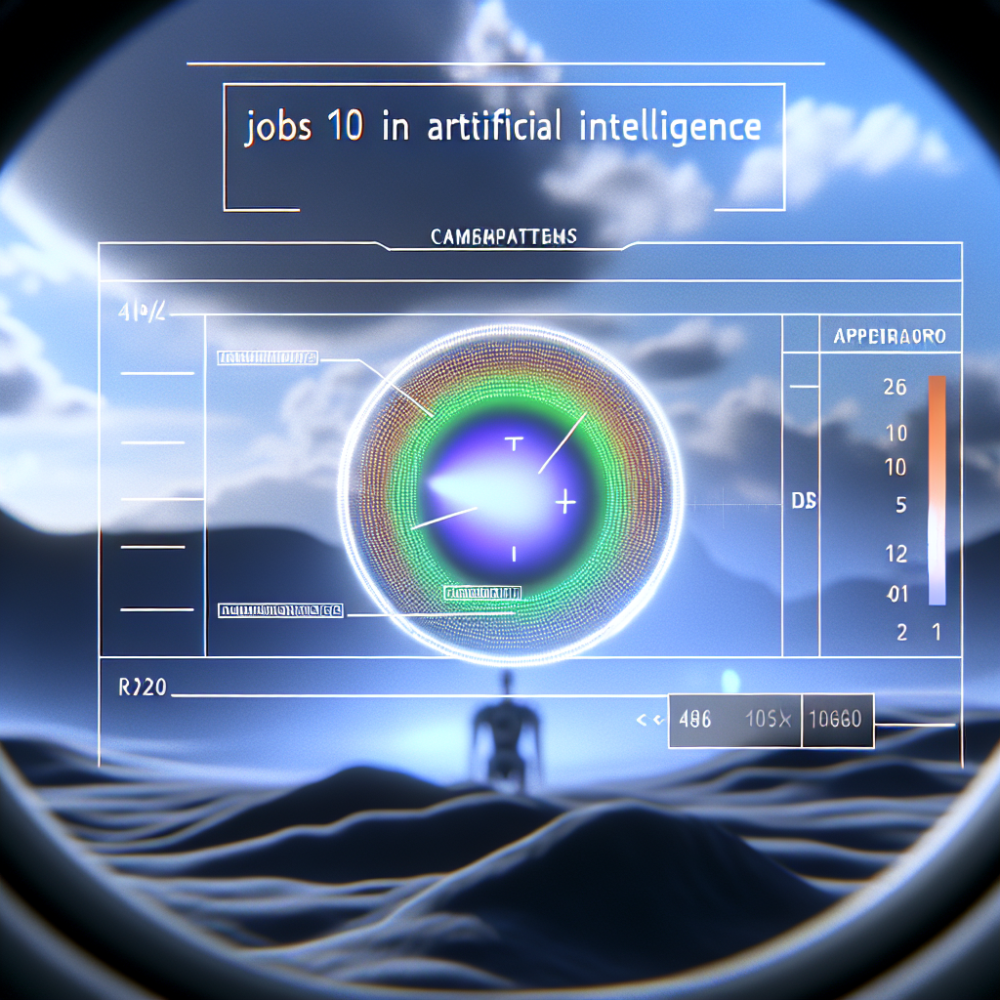The Role of AI Engineers in Shaping the Future of Technology
Artificial intelligence (AI) has become an integral part of our lives, revolutionizing various industries and transforming the way we live and work. As AI continues to advance, the demand for professionals in this field is skyrocketing. Among the top jobs in AI, AI engineers play a crucial role in shaping the future of technology.
AI engineers are responsible for designing, developing, and implementing AI systems and algorithms. They work on creating intelligent machines that can perform tasks that typically require human intelligence. These tasks include natural language processing, speech recognition, computer vision, and machine learning.
One of the key responsibilities of AI engineers is to develop machine learning models. Machine learning is a subset of AI that focuses on enabling machines to learn from data and improve their performance over time. AI engineers use various algorithms and techniques to train these models, allowing them to make predictions or decisions based on the data they have been trained on.
In addition to developing machine learning models, AI engineers also work on data preprocessing and feature engineering. This involves cleaning and preparing the data, selecting relevant features, and transforming the data into a format that can be used by the machine learning algorithms. Data preprocessing is a critical step in the AI development process, as the quality of the data directly impacts the performance of the AI system.
Another important aspect of an AI engineer’s role is to optimize and fine-tune AI models. This involves experimenting with different algorithms, hyperparameters, and architectures to improve the performance of the AI system. AI engineers need to have a deep understanding of the underlying algorithms and techniques to effectively optimize and fine-tune the models.
AI engineers also play a crucial role in deploying AI systems into production. They need to ensure that the AI models are integrated seamlessly into existing systems and can handle real-time data. This involves working closely with software engineers and IT professionals to ensure the smooth deployment and operation of the AI systems.
Furthermore, AI engineers are responsible for monitoring and maintaining AI systems. They need to continuously monitor the performance of the AI models and make necessary adjustments to ensure optimal performance. They also need to address any issues or bugs that may arise and update the models as new data becomes available.
In addition to technical skills, AI engineers also need to possess strong problem-solving and analytical skills. They need to be able to understand complex problems and come up with innovative solutions using AI techniques. They also need to have good communication skills to effectively collaborate with other team members and stakeholders.
The demand for AI engineers is rapidly growing, with companies across various industries recognizing the potential of AI to drive innovation and improve efficiency. As AI continues to advance, the role of AI engineers will become even more critical in shaping the future of technology.
In conclusion, AI engineers play a vital role in the development and deployment of AI systems. They are responsible for designing, developing, and implementing AI algorithms and models. Their expertise in machine learning, data preprocessing, optimization, and deployment is crucial in shaping the future of technology. With the increasing demand for AI professionals, pursuing a career as an AI engineer can be a rewarding and promising choice.
Exploring the Growing Demand for AI Data Scientists in Various Industries
Artificial intelligence (AI) has become an integral part of our lives, revolutionizing various industries and transforming the way we work. As AI continues to advance, the demand for skilled professionals in this field is skyrocketing. Among the top jobs in AI, data scientists are in high demand across various industries. In this article, we will explore the growing demand for AI data scientists and the industries that are actively seeking their expertise.
Data scientists play a crucial role in the development and implementation of AI technologies. They are responsible for collecting, analyzing, and interpreting vast amounts of data to derive meaningful insights. With the increasing reliance on AI, companies are recognizing the importance of data scientists in harnessing the power of AI to drive innovation and gain a competitive edge.
One industry that heavily relies on AI data scientists is healthcare. With the abundance of patient data, healthcare organizations are leveraging AI to improve diagnostics, develop personalized treatment plans, and enhance patient care. Data scientists in healthcare are tasked with analyzing medical records, genomic data, and clinical trials to identify patterns and develop predictive models. Their work is instrumental in improving patient outcomes and revolutionizing the healthcare industry.
Another industry that is actively seeking AI data scientists is finance. Financial institutions are leveraging AI to automate processes, detect fraud, and make data-driven investment decisions. Data scientists in finance are responsible for developing algorithms that can analyze market trends, predict stock prices, and optimize trading strategies. Their expertise is crucial in ensuring accurate and efficient financial operations.
The retail industry is also embracing AI to enhance customer experience and drive sales. AI data scientists in retail are responsible for analyzing customer data, such as purchase history and browsing behavior, to develop personalized recommendations and targeted marketing campaigns. By leveraging AI, retailers can provide a more personalized and seamless shopping experience, ultimately increasing customer satisfaction and loyalty.
The transportation industry is another sector that is witnessing a surge in demand for AI data scientists. With the rise of autonomous vehicles, data scientists are needed to develop algorithms that can analyze real-time data from sensors and cameras to ensure safe and efficient navigation. Their work is crucial in advancing the development of self-driving cars and revolutionizing the way we commute.
The manufacturing industry is also recognizing the potential of AI in improving efficiency and productivity. AI data scientists in manufacturing are responsible for analyzing production data to identify bottlenecks, optimize processes, and predict equipment failures. By leveraging AI, manufacturers can reduce downtime, improve product quality, and streamline operations.
The energy sector is yet another industry that is actively seeking AI data scientists. With the increasing focus on renewable energy and sustainability, data scientists are needed to analyze energy consumption patterns, optimize power grids, and develop predictive maintenance models for renewable energy infrastructure. Their work is instrumental in driving the transition towards a greener and more sustainable future.
In conclusion, the demand for AI data scientists is rapidly growing across various industries. From healthcare to finance, retail to transportation, and manufacturing to energy, companies are recognizing the importance of data scientists in harnessing the power of AI to drive innovation and gain a competitive edge. As AI continues to advance, the role of data scientists will become even more critical in shaping the future of industries worldwide.
How AI is Revolutionizing the Healthcare Industry: Top AI Healthcare Jobs
Artificial intelligence (AI) has become a game-changer in various industries, and one sector that has seen significant transformation is healthcare. With the ability to analyze vast amounts of data and make accurate predictions, AI has revolutionized the way healthcare professionals diagnose and treat patients. As a result, there is a growing demand for professionals with expertise in AI within the healthcare industry. In this article, we will explore the top 10 AI healthcare jobs that are shaping the future of medicine.
1. AI Research Scientist: These professionals are at the forefront of AI innovation in healthcare. They develop algorithms and models that can analyze medical data, such as patient records and imaging scans, to identify patterns and make predictions. AI research scientists work closely with healthcare professionals to develop AI-powered tools and technologies that improve patient outcomes.
2. Machine Learning Engineer: Machine learning is a subset of AI that focuses on developing algorithms that can learn from data and make predictions or decisions without being explicitly programmed. Machine learning engineers in healthcare develop models that can analyze medical data and assist in diagnosing diseases, predicting treatment outcomes, and personalizing patient care.
3. Data Scientist: Data scientists play a crucial role in healthcare AI by collecting, cleaning, and analyzing large datasets. They use statistical techniques and machine learning algorithms to extract meaningful insights from the data, which can be used to improve patient care, optimize hospital operations, and develop new treatments.
4. AI Ethicist: As AI becomes more prevalent in healthcare, ethical considerations become increasingly important. AI ethicists ensure that AI systems are developed and used responsibly and ethically. They address issues such as privacy, bias, and transparency, and work towards creating guidelines and regulations for the ethical use of AI in healthcare.
5. Clinical Informaticist: Clinical informaticists bridge the gap between healthcare and technology. They are responsible for managing and analyzing healthcare data, implementing electronic health record systems, and ensuring that healthcare professionals have access to accurate and up-to-date information. With the integration of AI, clinical informaticists play a vital role in optimizing the use of AI technologies in healthcare settings.
6. AI Product Manager: AI product managers oversee the development and implementation of AI-powered healthcare products and services. They work closely with AI researchers, engineers, and healthcare professionals to identify market needs, define product requirements, and ensure that AI solutions meet the needs of healthcare providers and patients.
7. Telemedicine Specialist: Telemedicine has gained significant traction in recent years, and AI is playing a crucial role in its advancement. Telemedicine specialists leverage AI technologies to provide remote healthcare services, such as virtual consultations and remote monitoring. They ensure that patients receive quality care from the comfort of their homes, while also reducing the burden on healthcare facilities.
8. AI Implementation Specialist: AI implementation specialists are responsible for integrating AI technologies into existing healthcare systems. They work closely with healthcare providers to understand their needs, identify areas where AI can be beneficial, and oversee the implementation process. Their goal is to ensure a smooth transition to AI-powered healthcare systems and maximize the benefits of AI in patient care.
9. Healthcare Robotics Engineer: Robotics is another area where AI is making significant strides in healthcare. Healthcare robotics engineers design and develop robots that can assist in surgeries, perform repetitive tasks, and provide support to healthcare professionals. These professionals combine their knowledge of AI and robotics to create innovative solutions that improve patient outcomes and enhance the efficiency of healthcare delivery.
10. AI Consultant: AI consultants provide guidance and expertise to healthcare organizations looking to adopt AI technologies. They assess the organization’s needs, evaluate available AI solutions, and develop strategies for successful AI implementation. AI consultants play a crucial role in helping healthcare organizations navigate the complex landscape of AI and make informed decisions that drive positive change.
In conclusion, AI is transforming the healthcare industry, and the demand for professionals with expertise in AI is on the rise. From AI research scientists to AI consultants, these top 10 AI healthcare jobs are shaping the future of medicine. As AI continues to advance, these professionals will play a vital role in improving patient care, optimizing healthcare operations, and revolutionizing the way we approach healthcare.
The Impact of AI on Business: Top AI Job Opportunities in the Corporate World
Artificial intelligence (AI) has become an integral part of the corporate world, revolutionizing the way businesses operate. As AI continues to advance, the demand for professionals with expertise in this field is skyrocketing. In this article, we will explore the top 10 job opportunities in AI and how they are shaping the future of business.
1. Machine Learning Engineer: Machine learning is at the core of AI, and machine learning engineers play a crucial role in developing algorithms and models that enable machines to learn and make decisions. These professionals are in high demand, as businesses seek to leverage the power of machine learning to gain a competitive edge.
2. Data Scientist: Data is the fuel that powers AI, and data scientists are the ones who extract valuable insights from vast amounts of data. They use statistical analysis and machine learning techniques to uncover patterns and trends, helping businesses make data-driven decisions.
3. AI Research Scientist: AI research scientists are at the forefront of AI innovation. They conduct research to develop new algorithms and models, pushing the boundaries of what AI can achieve. Their work is instrumental in advancing AI technology and driving business growth.
4. AI Ethicist: As AI becomes more prevalent, ethical considerations become increasingly important. AI ethicists ensure that AI systems are developed and used in a responsible and ethical manner. They address issues such as bias, privacy, and transparency, helping businesses navigate the ethical challenges associated with AI.
5. AI Product Manager: AI product managers bridge the gap between technical teams and business stakeholders. They understand the capabilities of AI and work closely with stakeholders to identify opportunities for AI integration. They play a crucial role in defining the AI strategy and roadmap for businesses.
6. AI Consultant: AI consultants provide expert advice to businesses on how to leverage AI to achieve their goals. They assess the business needs, identify AI opportunities, and develop implementation plans. Their expertise helps businesses harness the full potential of AI and stay ahead of the competition.
7. AI Solutions Architect: AI solutions architects design and implement AI systems that meet the specific needs of businesses. They work closely with stakeholders to understand requirements and develop AI solutions that deliver tangible results. Their technical expertise and problem-solving skills are invaluable in deploying AI systems effectively.
8. AI Business Analyst: AI business analysts bridge the gap between business and technology. They analyze business processes and identify areas where AI can be applied to improve efficiency and productivity. They also assess the impact of AI on business operations and help develop strategies for successful AI adoption.
9. AI Software Engineer: AI software engineers develop the software infrastructure that powers AI systems. They design and implement algorithms, optimize performance, and ensure the reliability and scalability of AI applications. Their expertise is essential in building robust and efficient AI systems.
10. AI Trainer: AI trainers play a crucial role in training AI models. They curate and annotate datasets, ensuring that AI systems learn from high-quality and diverse data. Their work is essential in improving the accuracy and performance of AI models.
In conclusion, the impact of AI on business is undeniable, and the demand for AI professionals is soaring. From machine learning engineers to AI trainers, these top 10 job opportunities in AI are shaping the future of business. As AI continues to evolve, businesses that embrace AI and invest in AI talent will have a significant advantage in the corporate world.







Leave a Reply
You must be logged in to post a comment.